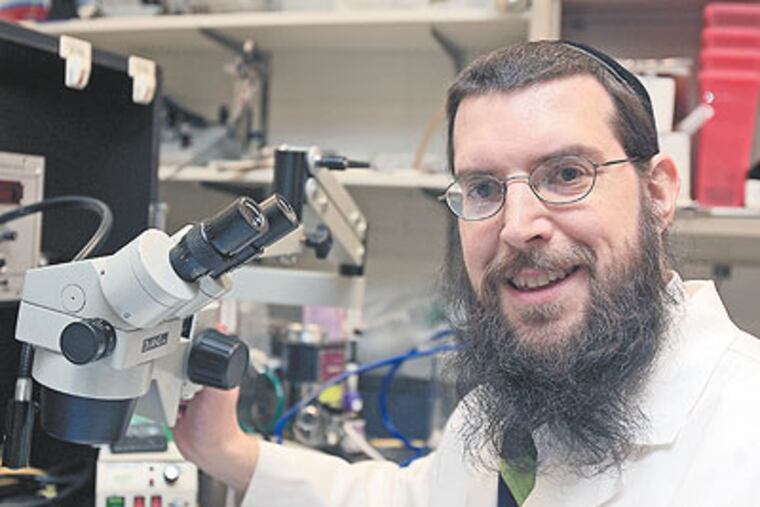Study confirms that caffeine may help ease a hangover
Sometimes the old methods may work best. Researchers at Thomas Jefferson University say that they've identified a key agent in the brain chemistry responsible for hangover headaches and that a good remedy is one tried by every tormented soul who's ever groped for a morning-after cup of coffee:

Sometimes the old methods may work best.
Researchers at Thomas Jefferson University say that they've identified a key agent in the brain chemistry responsible for hangover headaches and that a good remedy is one tried by every tormented soul who's ever groped for a morning-after cup of coffee:
Caffeine.
The stimulant has long been an ingredient in over-the-counter headache medications. But the Jefferson study is the first to link caffeine's effectiveness to its ability to block the activity of a chemical called adenosine.
The researchers, who conducted their study on laboratory rats, also found they could relieve alcohol-induced headaches with an anti-inflammatory drug in the same family as ibuprofen. (And yes, there is a way to tell if a rodent feels like your Uncle Ed after a bender. More on that later.)
While the research left some other scientists unconvinced, it represented a foray into an area of medicine that doesn't get much study. That may be because hangovers elicit little sympathy, said alcoholism researcher Robert Swift, a professor of psychiatry and human behavior at Brown University's Alpert Medical School.
"There are people who feel that one deserves to get a hangover, a negative consequence of drinking that might deter further drinking," he said.
Deserved or not, the affliction has stricken mankind at least since biblical times, as another researcher noted a few years ago in the Annals of Internal Medicine. See Isaiah 5:11, which says, "Woe unto them that rise up early in the morning, that they may follow strong drink."
The new study was overseen by Michael L. Oshinsky, director of preclinical research at the Jefferson Headache Center.
In the journal PLoS One, he and colleagues wrote that they began by giving an "inflammatory soup" to the rats - administered through a small hole in the skull, multiple times over a three-week period, to make them more sensitive. Such rats have previously been shown to be extra-sensitive to some of the same chemicals that trigger migraines in humans.
The researchers then gave the animals the equivalent of one alcoholic drink, and they proceeded to block various steps in the pathway of metabolizing alcohol, so as to see which by-products led to headache-like symptoms.
They concluded that the problem starts with a chemical called acetate. Excess acetate leads in turn to the formation of adenosine, which accumulates in the brain and appears to be a chief culprit in headaches, the authors wrote.
The presence or absence of "headaches" in the animals was determined by prodding them with nylon filaments around the eye area, the same area that becomes tender in some human migraine suffers. A rat that responded by recoiling or stroking its face was deemed to have "hangover-like hypersensitivity." Rats that got caffeine or the anti-inflammatory drug, on the other hand, showed no such reaction.
In a search of the literature, Oshinsky found another intriguing clue. Dialysis clinics used to administer acetate to kidney patients, and 25 percent of them would report getting headaches.
"That was the real instant for me to say, 'Oh, it's the acetate,' " he said.
Swift, the Brown University professor, said the researchers' use of the rat model was "reasonable" and said the breakdown of acetate may indeed contribute to headaches. But he cautioned that a hangover can include plenty of other symptoms, such as nausea, fatigue, and aversion to bright light.
"I don't think we have a definitive answer about what causes hangover," he said. "Nor do we have a definitive cure."
Another source of hangover malaise, Swift said, may be that alcohol causes the liver to release hormones called inflammatory cytokines - the same chemicals that play a role in making a flu patient feel lousy.
The caffeine finding did not surprise one local observer of alcohol consumption: Michele Eyre, a bartender at Archie's in Jenkintown.
"That does help," she confirmed, when told of the research at Jefferson.
The morning after a night of excess, Eyre said, bleary-eyed patrons have been known to come in for a restorative Coke, along with a bag of chips and a cheesesteak.
"You have the salt, the caffeine, and the grease," she said.
One gentleman, she said, swears by a concoction of Alka Seltzer and one teaspoon each of vinegar and yellow mustard. Science hasn't quite caught up with that one yet, perhaps.
No account of hangover remedies would be complete without mention of the oft-touted "hair of the dog" approach - i.e., drinking more alcohol.
Swift said more alcohol may indeed reduce symptoms, but only for a time, and he advises against it.
Here's what happens: In addition to ethanol, alcoholic drinks may contain small amounts of methanol, which the body breaks down into toxic formaldehyde and formic acid.
The same enzymes break down both ethanol and methanol, but they "prefer" to metabolize ethanol, Swift said. Thus, replenishing the supply of ethanol, or so the theory goes, would postpone the breakdown of methanol - making the person feel better for a while.
"It just delays the inevitable, I would think," he said, adding that moderation is the best approach. "The best way to treat a hangover is not to get one in the first place."
Whatever the future holds for the field of hangover research, perhaps no study will emerge on a day with a stronger connection to the cause of the malady.
Oshinsky's paper was published on New Year's Eve.